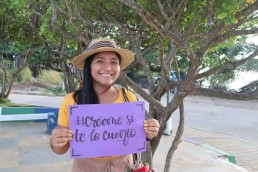Protecting Children from Violence and Exploitation
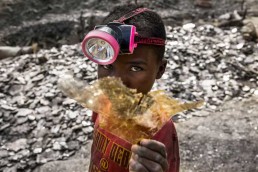
In 2021, we opened an office in Madagascar following the success of our FAMAHA project (Fampiasana Ankizy @ Mica, Andao Fongorina, Atsahatra) against child labour in mica mining in India, one of the largest exporters of mica (a miracle mineral used in paints, cosmetics, electronics and automobile)s. Approximately ten thousand Malagasy children, as young as 4, work alongside their families to extract mica to survive. They are exposed to substantial risks to their health and well-being, often facing chronic food insecurity. Many can develop severe respiratory problems and experience major back pains from carrying heavy loads.
At least 11 000 children are believed to be working in the informal, artisanal mica mining industry, working long hours and skipping school in Madagascar. The new programme consists of informing parents about the importance of education, helping them with additional alternative income and supplying school materials to the children and schools. The project also raises awareness among the public and national government regarding child labour. As a result, the Madagascar government has designed a national action plan to end child labour in mica mining. And we are calling on private companies to join the “Responsible Mica Initiative” and to prioritise safety and ban child labour.
2. India
| GOOD Project | Terre des Hommes Netherlands
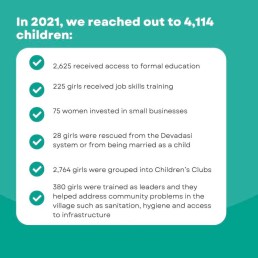
The GOOD project (Getting Out Of Devadasi system) aims to protect young girls from the Devadasi community in the Indian province of North Karnataka, from sexual exploitation, to fight for their rights and enrol them into schools. An overwhelming number of girls from socio-economically disadvantaged Devadasi communities from North Karnataka are forced into a life of sex work as part of a societal tradition. Devadasi, which means servant of God or Goddess, a form of religious practice where a girl in her prepubescent period is offered into worship and service of deity for the rest of her life by her parents. After the marital ceremony, young girls are made to engage in sex work.
Learn more about Children Empowerment for Getting Out of the Devadasi System.
3. Tanzania
| Stand against FGM | Terre des Hommes Netherlands
For several years, we have partnered with the Association for the Termination of Female Genital Mutilation (ATFGM) to stop female genital manipulation (FGM) and child marriage in the Kuria community in Tanzania. Mutilating the genitals of young girls against their will and marrying them off is customary in northern Tanzania; it is a form of violence and violates the rights of women and girls. There are no health benefits to FGM, the consequences include severe pain and bleeding, infections, injury and sometimes death. For the girls who are left uncut in Tanzania, they are stigmatised and seen as unfit to marry or unable to have children.
ATFGM was established in response to the concerns of several parents in the Kuria community who did not want their daughters to be mutilated. The young girls also asked for protection against the dangerous practice. The programme helps to educate the community and promotes respect for human dignity and human rights, with the ultimate goal of bringing positive change and eradicating FGM with the help of the government.
Learn more about the Stand against female genital mutilation project.

4. Bangladesh
| Technical and vocational training for youth | Terre des Hommes Netherlands
In 2021, we launched a new programme in Bangladesh to develop the technical skills of vulnerable young people. The three year initiative aligns with the priorities of the Asia Development Bank, World Bank, ILO, and the Government in Bangladesh by providing appropriate skills to vulnerable young people with few training opportunities in Savar, in the Dhaka District, Bangladesh. This is arranged through quality Technical and Vocational Education and Training (TVET) centres.
Despite the lockdowns in Bangladesh and the forced closure of the training centres due to COVID-19, a total of 510 vulnerable young adults were initially reached. 400 of them were selected to complete the TVET programme, receiving technical and vocational training. They were also educated in life skills training, including child safeguarding, child participation, communication and leadership skills, workplace safety and workers’ rights. As a result, 356 graduates quickly found employment and the remaining 44 trainees graduated at the end of the year.
5. Europe
| REVIS project | Terre des Hommes Foundation in Lausanne
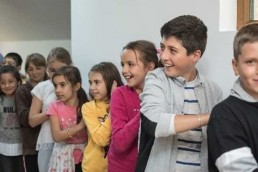
Our Responding to Violence against children in Schools and adjacent settings (REVIS) project responds to violence faced by children in and out of schools across the Balkans and South-East Europe. Piloted in 2021, in Bulgaria, Croatia, Romania and Serbia, the project, supported by 80 trained facilitators, has already transformed the lives of 350 children. It has enabled them to embrace new perspectives and young people are becoming confident to speak out. Not only do they say ‘no’ to violence, they actively reject and replace the harmful norms that reinforce it.
Children and teachers are noticing the impact that REVIS is having on their social norms. “They talk freely, have initiative, no longer feel constrained in school and report any form of violence because they want to feel safe and protected, “says a facilitator in Romania.
Learn more about the REVIS Project.
6. South America
| #CréemeSiTeLoCuento campaign | Terre des Hommes Switzerland
In South America, the regional #CrémeSiTeLoCuento campaign, which translates to ‘Believe me if I tell you,’ was organised in Bolivia, Brazil, Colombia and Peru. The campaign raised awareness about violence against women and highlighted the importance of listening to women and girls. The campaign launched on 11 October and lasted for 45 days, until November 25 to commemorate the International Day of Non-Violence Against Women.
#CrémeSiTeLoCuento strengthened the voices of girl advocates who already challenged adults daily, calling on them to accompany, protect and respect them. It also highlighted the different forms of violence suffered by many girls and young women across Latin America. Local partners and children/youth groups reached 12,000 people with messages about preventing violence against women and girls.
